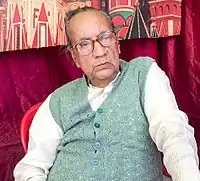Sudhir Chakraborty
Sudhir Chakravarti (19 September 1934 – 15 December 2020) was a Bengali educationist and essayist. He made a vast contribution in Bengal's folk culture development and research.
Sudhir Chakravarti | |
|---|---|
 | |
| Born | 19 September 1934 Shibpur, Bengal Presidency, British India |
| Died | 15 December 2020 (aged 86) Kolkata, West Bengal |
| Occupation | Literary, teacher, educator, music specialist |
| Language | Bengali, India |
| Alma mater | M.A. University of Calcutta, Ph.D. Jadavpur University |
| Notable works | |
| Notable awards | Ananda Puraskar Sahitya Akademi Award (1985) Shiromani Award Acharya Dinesh Chandra Sen Award Narashinga Das Award Sarojini Basu Gold Medal |
| Spouse | Nivedita Chakravarti |
| Children | Sananda Chakravarti, Sreya Chakravarti |
Early life and career
Sudhir Chakravarti was born on 19 September 1934 at Shibpur. His father's name was Ramaprasad Chakravarti and his mother Beenapani Chakravarti. He was the youngest of the nine sons of Ramaprasad. Due to the fear of the Japanese bombardings in Calcutta, Chakravarti's father had shifted to Dignagar, Nadia, (where they had ancestral lands as Zamindars) from Shibpur, Howrah in his childhood. After that his family came to Krishnanagar, Nadia.[1] Chakravarti completed his studies in Calcutta University and in 1966 married Nivedita Chakravarti. Chakravarti is known for his research works on Folk religion, Lalan Fakir and Cultural Anthropology in Bengal. He spent 30 years researching the folk culture by traveling to different villages all over the West Bengal.[2] He was a professor of Bengali literature since 1958 to 1994, but even after retirement kept on teaching until 2011. Chakravarti worked in Krishnagar Government College, guest lecturer of Jadavpur University and was also associated with the Institute of Development Studies, Kolkata. He wrote and edited more than 85 books on various subjects like music, art, folk-religion, cultural anthropology. He was the editor of Bengali literary Magazine Dhrubapada.[3] He passed away on 15 December 2020 in Kolkata.[4][5]
Works

- Sahebdhoni Somproday o tader gan
- Gobhir Nirjon Pothey
- Baul Fakir Katha
- Sadar Mafassal
- Nirjan Ekaker Gan Rabindra Sangeet
- Akkhaner Khoje
- Bangla Flimer Gan O Satyajit Roy
- Rabikararekha
- Lalan
- Bratyo Lokayata Lalan
- Dekha Naa Dekhay Mesha
- Bangla Dehatatter Gaan
- Roope Barne Chhande
- Nirjan Sajane
- Loksamaj O Lokchitra
- Nirbas
- Lekha pora kore je
- Bangla ganer alokporbo
- Anek diner anek katha
- Bolahari somproday ar tader gaan
- barne barne pushpe parne
- charano ei jibon
- Manini rupmati kubir gosai
- Gaane Gaane gaoya
- Nirjon sojone
- Lalon sai kubir gosai o tader 100 gaan
- Shamuk jhinuk
- Gaaner leelar sei kinare
- Mati prithibir taane
- sahityer lokayato path
- Lokayoter onyo baanke
- Nirbachito akhyan
- Nibhrito moner chaya
- Panchagramer korocha
- Poschimbonger melamohotsav
- Shilper khoje
- Dwijendralal roy Smaran Bismaran
- Along deep lonely alleys (English translation of gobhir nirjon pothe)
- Six volumes of Sudhir Chakravarti Rachanavali
Awards
Chakravarti received the Ananda Purashkar in 2002 for his book Baul Fakir Katha and the Sahitya Akademi Award 2004.[6] He got the awards of Eminent Teacher from Calcutta University in 2006,[7] Narasimha Das award and the Dr. Sukumar Sen Gold Medal from the Asiatic Society. He has also been awarded by the Tagore research Institute the title of Rabindratatvacharya.
References
- "কোথায় গেল সে সব আশ্চর্য পড়শিরা". anandabazar.com. Retrieved 27 April 2018.
- "Their music inspired Tagore, Bob Dylan: This book tells you all about Bauls of Bengal". Hindustan Times. Retrieved 27 April 2018.
- "Dr. Sudhir Chakraborty". nadia.gov.in. Retrieved 27 April 2018.
- MP, Team (16 December 2020). "Sahitya Akademi awardee Sudhir Chakraborty passes away". www.millenniumpost.in. Retrieved 16 December 2020.
- সংবাদদাতা, নিজস্ব. "লোকসংস্কৃতি গবেষক সুধীর চক্রবর্তী প্রয়াত". anandabazar.com (in Bengali). Retrieved 16 December 2020.
- "AKADEMI AWARDS (1955–2016)". sahitya-akademi.gov.in. Retrieved 27 April 2018.
- "Recipient of Eminent Teacher Awards". Retrieved 27 April 2018.
| Wikimedia Commons has media related to Sudhir_Chakrabarty. |
